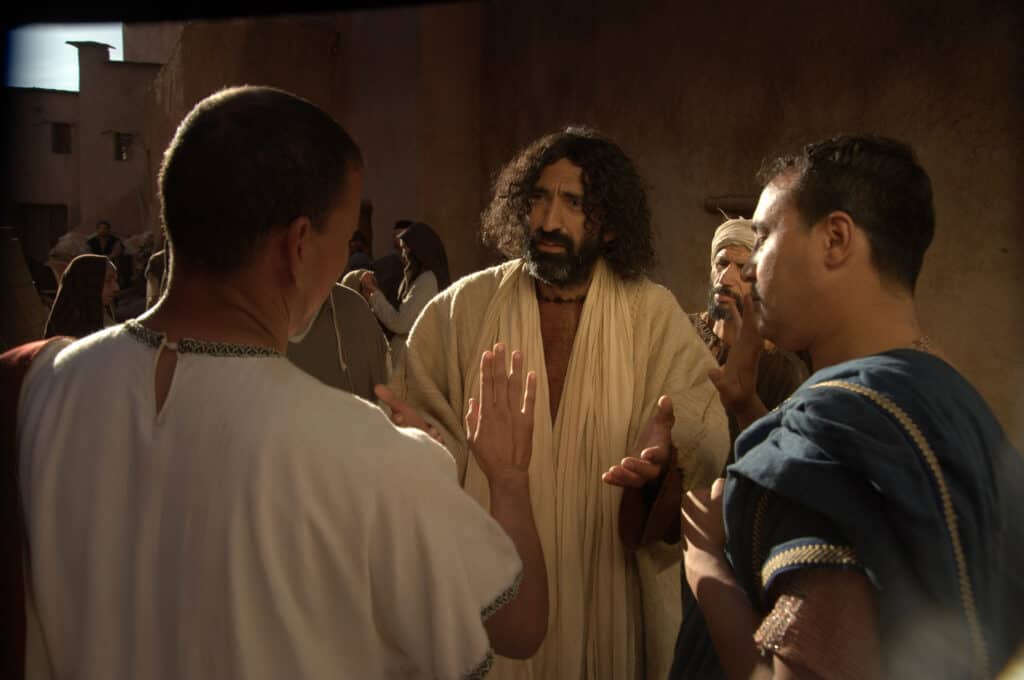
The unforgivable sin is described in the Bible as “blasphemy against the Holy Spirit” (Matthew 12:31; Mark 3:29; Luke 12:10). Other terms used are “slander,” “impious speaking,” or even to “say evil things” against the Holy Spirit.
Jesus isn’t talking about something we might do and regret later because we’re having a bad day.
This refers to a willful act and a consistent disregard.
But even so, what does it actually mean to “blaspheme” against the Holy Spirit?
We’ll look deeper into Scripture to learn about:
- Our sin vs. God’s forgiveness
- What Jesus says about the unpardonable sin
- Why the unforgivable sin is against the Holy Spirit
- How a relationship with God is the answer
- God’s forgiving nature
Let’s start by looking at how our sin is matched by God’s forgiveness
Can we do something too bad for God to forgive?

They’ll never forgive me for this…
Most of us have had thoughts like this at some point in our lives—so sure we’ve done something so terrible, or messed up so badly, that the people we care about could never forgive us.
Perhaps we’ve believed that even God would not forgive us.
It’s a scary thought, the idea that there’s something out there so terrible and unholy that even the merciful, loving Creator cannot bring Himself to forgive it.
But God doesn’t want us to live in a spirit of fear (2 Timothy 1:7), constantly watching ourselves lest we commit a certain sin that drives us beyond the bounds of His forgiveness.
But if anyone does sin, we have an advocate with the Father, Jesus Christ the righteous
1 John 2:1, ESV
Jesus died on the cross so we could have His forgiveness. And God wants us to trust His love and mercy, understanding that—no matter how far we fall—if we come to Him, He’s always ready to lead us back home.
But as far as the “unforgivable” or “unpardonable” sin goes, let’s go straight to the source and see what Jesus was talking about.
Curious about how God’s forgiveness works? Learn what the Bible tells us.
What Jesus says about the unpardonable sin

There are three instances in the Gospels where Jesus speaks of a sin that will not be forgiven—in Matthew 12, Mark 3, and again in Luke 12.
Matthew tells us that Jesus had just been to the synagogue, where He healed a man’s withered hand on the Sabbath. That angered the Pharisees as it broke their “rules” about Sabbath-keeping.
Jesus then angered them further by healing a blind and mute man who was possessed by a demon.
Mark describes the situation a little differently, involving the scribes and the large crowd of people who followed Jesus wherever He went so they could be healed.
In both instances, the Pharisees and scribes insist that Jesus is doing all these miraculous things not through the power of God but through the power of Satan.
It is only by Beelzebul, the prince of demons, that this man casts out demons
Matthew 12:24
Jesus knew the minds and hearts of the Pharisees. He could sense their contempt. He knew they felt threatened by Him and that they had recently been discussing how to get rid of Him (Matthew 12:14).
Jesus responds to their accusations by pointing out the logical problem of Satan’s forces being turned against each other (Mark 3:23–27). He then gives this warning:
Therefore I tell you, every sin and blasphemy will be forgiven people, but the blasphemy against the Spirit will not be forgiven. And whoever speaks a word against the Son of Man will be forgiven, but whoever speaks against the Holy Spirit will not be forgiven, either in this age or in the age to come
Matthew 12:31–32, ESV
Jesus gives the same warning in Mark, saying:
Truly, I say to you, all sins will be forgiven the children of man, and whatever blasphemies they utter, but whoever blasphemes against the Holy Spirit never has forgiveness, but is guilty of an eternal sin
Mark 3:28–29, ESV
In both Gospels, Jesus is up against people who claim He is not acting under the authority of God, but the devil. They’re attributing all His loving miracles, healing, and teachings to an evil power rather than a good power.
And they know better.
Why is the unforgivable sin against the Holy Spirit?

But what does it specifically mean to blaspheme against the Holy Spirit, and why is this blasphemy such a terrible act that not even God will forgive it?
First off, we’ll address the word “blaspheme,” as it isn’t a commonly used word these days. To blaspheme means to treat something or someone with extreme disrespect.
That’s what the scribes and Pharisees were doing when they made accusations against Jesus’ ministry and claimed that He received His power from Satan, not God. They were intentionally misrepresenting the Holy Spirit’s work through Jesus, giving people a warped view of God’s character.
In fact, they were asserting that He was the very opposite of what He proclaimed—that His ways of love and compassion were not of God but of Satan.
The Bible hints that the Pharisees themselves didn’t actually believe Jesus was performing miracles by the power of the devil. The whole argument was illogical, as Jesus pointed out (Matthew 12:24–29, Mark 3:22–27). But they were more consumed with asserting their own agenda and exalting their own authority.
Jesus knew their thoughts. And they must have known that all the good Jesus was doing could only have come from a good source, as good fruit can only come from a good tree (Matthew 12:33–37). But they thrust that knowledge to the back of their minds, concerned only with opposing Jesus.
And here we come to the root of the problem—what it truly means to blaspheme and go against the Holy Spirit. Blaspheming the Holy Spirit means to purposely shut it out, to stop listening to God’s voice. Even to the point of slander without remorse.
That is the unforgivable sin—because it cuts us off from the source of all forgiveness.
All through Christ’s ministry, His goal was to illustrate God’s character. He wanted to help people open their hearts and allow God to speak to them.
The Pharisees weren’t willing to listen. They had become so stubborn, so determined to be wise in their own eyes, that they blocked out God’s message even when it was right in front of them. They willfully ignored the Holy Spirit.
Once they were determined to silence the Holy Spirit and their own consciences, the Pharisees had committed the unforgivable sin. Not because of one particular act. But because they repeatedly pushed away everything that showed them that Jesus was the Son of God.
By continuing to do this, they severed their connection to God and His Holy Spirit.
Without that connection, there can be no forgiveness. For God is the only one with the power to forgive our sins.
So long as we earnestly seek Him and want to do His will, we can be forgiven.
But if we consistently insist on defying Him and going our own way, despite the Holy Spirit’s efforts to draw us back, we shut off our conscience. We doom ourselves to a life without God. Without forgiveness.
(And if you’re reading this, chances are you haven’t done that.)
A relationship with God is the answer

Through a careful inspection of Scripture, we get a clearer image of what it means to commit an unforgivable sin. It doesn’t mean we’ve messed up so badly or done something so heinous that God refuses to forgive us no matter how many times we ask.
Rather, the sin against the Holy Spirit is done on purpose—when a decision is made to block out God’s voice and reject the Holy Spirit’s influence.
When that happens, God’s forgiveness can no longer reach us because we refuse to be reached. And God always respects freedom of choice.
The unforgivable sin is not a case of God refusing to take us back when we repent, but rather a case of us shutting ourselves off from the possibility of repentance. It’s deliberately severing our connection to God, even though we know His love and the sacrifice He made for us.
We see this principle illustrated in Hebrews 10.
For if we sin willfully after we have received the knowledge of the truth, there no longer remains a sacrifice for sins, but a certain fearful expectation of judgment, and fiery indignation which will devour the adversaries.… Of how much worse punishment, do you suppose, will he be thought worthy who has trampled the Son of God underfoot, counted the blood of the covenant by which he was sanctified a common thing, and insulted the Spirit of grace?
Hebrews 10:26–29, NKJV
If we know the pain Jesus went through for us, understand the truth of God’s law, and still insist on turning our back on God and going our own way, what is left for us? We have cut ourselves off from the only true source of forgiveness and have condemned ourselves by our own choices.
This can be a depressing thought, but there is some comfort in it, too. The comfort is that, so long as we still desire to be close to God, so long as we still want His presence in our lives, He will never abandon us.
“Nothing is final,” explains Sam Neves, Associate Director of Communication at the General Conference of Seventh-day Adventists. “So long as we have the desire to repent, the Holy Spirit is still with us.”
We’re all going to sin and fail many times in our lives, but so long as we remain receptive to God by praying to Him daily and studying His Word, we can keep our connection with Him strong.
So long as that relationship holds, we need never fear that we have committed an unforgivable sin.
God wants to forgive!

Jesus gave us many valuable lessons and warnings during His time on earth. He warned us of the dangers of cutting ourselves off from Him, of becoming so stubborn and hardhearted that we can no longer be reached by the Holy Spirit.
And that doesn’t sound like a pleasant state of being.
Reading through the Gospels, it sure doesn’t sound like the Pharisees were living happy, contented lives. They were consumed by their opposition to Jesus and their quest for power.
Jesus told us these things so we would be careful to maintain our relationship with Him through Bible study and prayer, rather than rejecting the Holy Spirit and insisting on doing things our own way, no matter the cost.
But Jesus knew that our sinful nature would let us down. That’s why He made His forgiveness readily available to us. We just need to ask for it.
The Pharisees’ fate certainly doesn’t have to be ours. Instead, we can embrace God as His humble and loving children, accepting His gift of salvation and forgiveness as we walk with Him.
Still got questions about forgiveness, repentance, and how the Holy Spirit works with us? Start your own personal online Bible study.